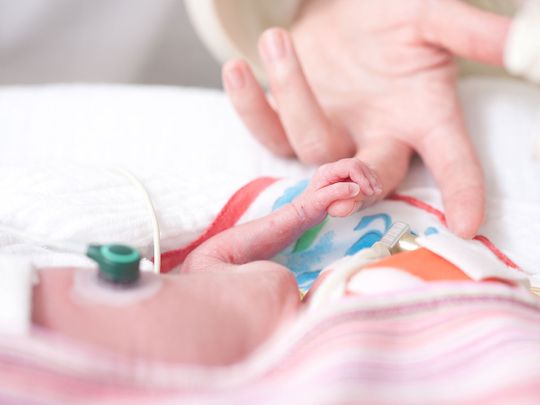
UK-based Gulf News reader Gopika Raiththa recalls in a matter-of-fact tone that a doctor had called her husband out of the ward to tell him that she might not survive the labour. “At one point, my husband walked in and he was very very upset … he came in and told me, ‘this is what I’ve been told – you may not make it or the baby may not make it, so make your final calls’.”
Raiththa wasn’t expecting the drama – or the death threat – when she started her day on the morning of September 27, 2020. She shrugs, “I had a fairly easy-going pregnancy.” But as she went about her business and the day drew to a close, the 26-week pregnant Briton had begun to suspect something was wrong; she had a terrible backache that was spreading, down her thighs and over her abdomen.
At about 10.30pm, when she decided she’d go to bed, she noticed with a fright that there was a massive gush of blood. She and her husband rushed to the nearest hospital, where they were immediately plugged into monitors; it was important to keep track of the heartbeats. “I stayed overnight in the hospital, we were monitored; my heartbeat, baby’s heartbeat as well – the baby’s heartbeat was very stable at the time, despite me losing a lot of blood,” she tells us.

But the blood continued to flow and even while getting injection upon injection – magnesium to help the development of the baby’s brain; steroids for the lungs because delivery was imminent – there were new hurdles to cross. For one thing, only some hospitals in the UK are equipped to take in children born so under-the-gestation period – the race against time for the search of one was on.
Through the night, they searched. And Raiththa bled. And her cervix, which had begun to dilate earlier, was already at 3cm.
The baby was coming.
• extremely preterm (less than 28 weeks),
• very preterm (28 to 32 weeks), and
• moderate to late preterm (32 to 37 weeks)
Approximately 15 million preemies are born every single year around the world. And of those born pre-term, one million die before the age of five.
Dazed, afraid and drained, Raiththa recalls her doctor walking in at some point – the hour had begun to blur because of the concoction of drugs she’d been put on – and saying: “We were just in a daze about things until the doctor came to say ….there’s a hospital that’s incubator-free so we need to transfer you. We got to the new hospital in 20 minutes. In that time, my contractions were getting worse and worse. It was excruciating. By the time we got to the hospital, I was 4cm dilated. And they said, ‘we need to get you to have a C-section as soon as possible’.”
Night had drifted into morning as the ambulance zipped into the parking lot of the new hospital and she was carried into surgery.
At 9.34pm on September 27, she gave birth. "The baby was born in good condition and despite three unsuccessful attempts of intubation, he pulled through,” she says.
But Khush – as the baby was now named – is a fighter. “He was only on the ventilator for two days.”
920 g
Khush's birth weight.
The thing about pre-term babies is they bear marks of the early ejection from the womb, no matter how healthy they may seem at first. Khush too suffered the first few weeks. “He developed jaundice two times and the whole process was really scary and daunting. The most painful thing for me was they went to the post-natal ward and I was the only one without a baby in my hands. I discharged myself after three days because I just couldn’t deal with not having my baby with me and to be around healthy full-term babies,” says Raiththa.
“Jaundice is treated depending upon the level of bilirubin and baby’s age. Mainly, it’s treated by phototherapy (baby kept under the blue light), but in rare cases if levels are high, one may need to do blood transfusions.”
Khush, who weighed only 920g at birth, spent five weeks in the neonatal intensive care unit (NCIU), followed by two months at a local hospital. “He developed a number of health issues and related to things that happen in the third trimester … we got through it in the end and we were able to come home on the 16th of December, which was a few days before my initial due date on 31st of December.”
A gratitude journal
“What I found really useful for myself was I kept a diary and in the diary, I wrote all the positives that happened in the day and it was almost as if I was writing letters to my son. So I’d say, ‘Dear Khush, yesterday I saw you, you were smiling. Or I held your finger for 20 minutes. Nice little positive notes, and weight as well. And I would end it with an ‘I’ll see you tomorrow.’’”
Raiththa says her husband was her rock. And having a strong support system kept her from breaking down. A lot of mums are not so fortunate. "Pre-term births, by their nature don’t mentally prepare new parents, especially if there are birth complications, medical complications in the new-born and the mother. Therefore, looking after the parent’s mental health by providing appropriate psycho-social support, identifying, and addressing existing mental health concerns in parents will help mitigate or alleviate the symptoms. Where appropriate, evidence-based trauma focused psychological interventions like Cognitive Behavioural Therapy and in some cases, medications may be required after a comprehensive evaluation," warns Dr Waleed Ahmed, Consultant Psychiatrist, Priory Wellbeing Centre Abu Dhabi.
A year on, she says, relief clear in her words: “We’ve been really fortunate, whenever we’ve had follow-up appointments, they’ve said Khush is well ahead,” she says.
They may have been given low odds of survival, but this is clearly a family with grit; like mother, like son.
Have a topic you'd like us to cover? Write to us at parenting@gulfnews.com








